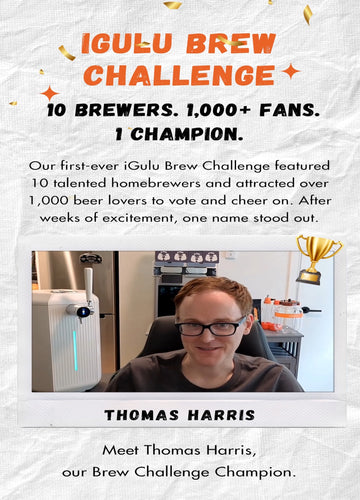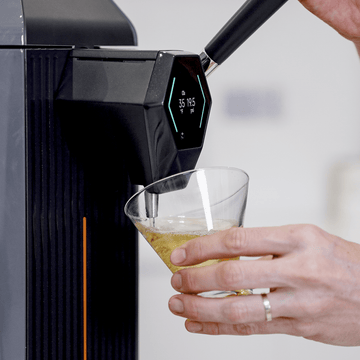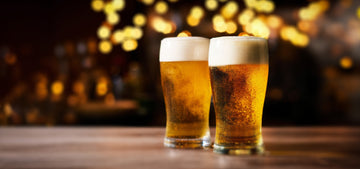The iGulu Brew Challenge is all about celebrating creativity, community, and innovation in homebrewing. What makes this competition special is that it isn’t limited to professional brewers–it welcomes everyone, from curious beginners to seasoned hobbyists, to showcase their ideas. One standout story is that of Thomas Harris, the iGulu Brew Challenge winner, who discovered a passion for brewing nearly two decades ago. Through iGulu, he turned his longstanding hobby into an award-winning beer.
Let’s dive into his story.
Who is Thomas Harris?
Thomas Harris isn’t a professional brewer. He works in manufacturing, but outside of work, he has been brewing for almost two decades. His first brewing experience was with his dad when he was 20. What might have started as a present turned into a father-son project, and brewing ultimately became a new hobby for him that hasn’t left him to this day.
Over the years, brewing for Thomas has become less about equipment and ingredients and more about connection. Today, he brews with his girlfriend. They see it as quality time together, as they enjoy experimenting with recipes and testing final results side by side.
Truthfully, when he first saw iGulu on Kickstarter, Thomas admits he was cautious. It looked “too good to be true.” But after thorough research, he came to the conclusion that the iGulu can make brewing at home not only easier but also more consistent. His girlfriend also approved, which was ultimately a deciding factor in getting an iGulu machine.
With years of casual homebrewing behind him and a new confidence using the iGulu F1, Thomas saw the iGulu Brew Challenge as an excellent opportunity to put his creativity to the test and see if others would appreciate the kind of beer he loves most just as well.
The Winning Beer: IP-eh? IPA
When it was time to submit his entry for the iGulu Brew Challenge, Thomas was sure about one thing. The brew has to be a pale ale.
Why? Well, it’s a style he’s always gravitated toward. Bold and hop-forward, IPA is the kind of beer you can enjoy casually but still appreciate for its depth.
Thomas named his brew IP-eh? IPA, as a nod to Canadian IPA traditions, blending humor with his love of hops. Just like the name, his brew is fun, approachable, and something you can (and should) share with others.
Thomas’s goal was simple: to make a balanced beer that is crisp, refreshing, and full of personality. In his words, it was meant to be “a simple, cozy beer” that anyone could enjoy, whether they were longtime IPA fans or tasting one for the first time.
Built on a foundation of light malt, IP-eh? has that bright, crisp quality that highlights hops at their best. Cascade provides bright citrus and floral notes, while Perle adds a gentle, herbal bitterness. The combination creates a beer that is refreshing from the first sip but has enough complexity to keep you coming back.
Brewing Philosophy
For Thomas Harris, brewing has never been just about beer. More than that, it’s about the people he shares it with. His very first batch was a gift from his dad, and brewing quickly became a way for them to spend some quality time together.
Today, his girlfriend is his brewing sidekick. For them, brewing is a project they create together, with laughter, conversation, and the anticipation of tasting their finished beer. Thomas says that being able to enjoy the final product as a couple makes the whole process even more rewarding.
What Thomas loves about brewing is that it combines science and creativity. On one side, you have the precision of temperatures, hop timing, and fermentation. But, there’s also the fun side of experimenting. Just a small tweak in ingredients or a different hop schedule here and there, and he can craft something entirely new.
That said, the path wasn’t always easy. Traditional homebrewing can be intimidating, as you have to work with large kettles, stick to strict cleaning routines, and face the constant fear of mistakes. Not to mention that living in an apartment only made those hurdles bigger.
But here’s where iGulu changed everything. Compact enough to fit on the countertop and smart enough to handle the details, the machine freed him from the stress of constant monitoring. Instead of worrying about equipment or conditions, Thomas could focus on what matters the most, which is the joy of experimenting and sharing his beer with others.
Thomas’s IP-eh IPA Recipe for Homebrewing
Ready to try Thomas’s recipe at home? You’ll need these ingredients :
-
Dry Malt Extract (Pilsen) 1.25 lb
-
Grains (50/50 Caramel 10, Carapils) 0.5 cup/ each
-
Hops (PERLE, CASCADE) 0.5 oz./each
-
Yeast (US-05) 2g
Here’s a step-by-step guide on how to replicate this award-winning IPA homebrew recipe:
Steeping the Grains
-
Add about 1 gallon of water to your brew kettle.
-
Place grains in the steeping bag and tie off the top in a knot.
-
Heat the water to 155°F. It should be warm but not boiling.
-
Steep the grains for 20 minutes, holding the temperature steady.
-
Gently remove the grain bag, but do not squeeze.
Boiling & Hops
-
Bring the wort to a boil. Remove from heat once the first bubbles appear.
-
Add in the dry malt extract, slowly stirring until fully dissolved.
-
Put the pot back on medium-high heat and bring to a gentle rolling boil.
-
Once boiling, add Perle hops and boil for 60 minutes.
If you want the beer to be less bitter, reduce the boil time to 30 minutes or so. Once there are 2 minutes left, add Cascade hops.
Cooling the Wort
-
After the boil, remove the pot from the heat.
-
Place it in an ice bath in the sink and cover with a lid.
-
Cool quickly to below 75°F.
Fermentation
-
Sprinkle US-05 yeast directly on the wort. You don’t have to stir it.
-
Place the keg in the iGulu F1 and let it ferment for 2 weeks at 68°F.
Finishing & Serving
-
After fermentation, chill to 37°F for at least 12 hours.
-
Pour, enjoy, and share with friends.
One brewer’s tip from Thomas that could make a difference in your brew is: “Don’t skip the dry hop — it gives you that extra burst of citrus aroma that makes the IPA shine.”
Lessons from a Winner
Thomas Harris’s story is proof that the best homebrewing success stories often start with simple recipes, a bit of curiosity, and the right tools. Here are a few lessons that both beginners and seasoned hobbyists can take away:
1. Don’t fear experimenting
Thomas initially followed simple recipes, but his confidence grew through using iGulu, enabling him to explore and experiment. His winning IPA isn’t a highly complex brew. Rather, it’s an experiment that combines simplicity and creativity. The main message for brewers is clear: there's no need to remain in the comfort zone. Experiment with different hop varieties, tweak the bitterness, or try making other fermented beverages. Each batch gives you a chance to learn something new.
2. Keep recipes simple but flavorful
You don’t have to chase complicated grain bills or mix multiple hop varieties. Thomas focused on just two hops (Perle and Cascade), and that gave his beer both bitterness and bright citrus flavor without overloading the flavor. Sometimes, two or three ingredients, chosen carefully, can create a more memorable pint.
3. Use iGulu for precision and consistency
Traditional brewing typically involves a lot of trial and error with variables like temperature and fermentation. However, by automating temperature control and fermentation management, the iGulu helped Thomas focus on creativity rather than troubleshooting. For those intimidated by the technical side of brewing, iGulu creates an equal footing, allowing you to enjoy the process without compromising quality.
4. Brewing is about connection
One thing that Thomas consistently pointed out is that the people around him are his biggest motivation. Brewing started as a bonding activity with his dad and has now become a way to connect with his girlfriend. Take this as a reminder that sharing a batch can make the hobby even more rewarding.
5. Progress comes step by step
For Thomas, winning the challenge didn’t happen overnight. He began with small experiments, grew confident using pre-designed kits, and eventually, that resulted in him creating his own recipe. So start small, learn with each batch, and don’t rush the process.
Start Your Own Winning Batch
Thomas Harris demonstrated that with the right tools and some creativity, anyone can brew a beer worth celebrating. His IP-eh? IPA began as a simple idea and ultimately won the iGulu Brew Challenge, proving that you don't need to be a professional brewery to make great beer.
Now it’s your turn. With iGulu’s smart brewing systems and recipe kits, you can also recreate Thomas’s winning IPA or craft your own signature brew. Your own brew story is waiting to be written.
FAQs
Who is Thomas Harris, the iGulu Brew Challenge winner?
Thomas Harris, iGulu Brew Challenge winner, has been a hobbyist brewer for almost 20 years. He started brewing with his father and now shares this passion with his girlfriend. His creativity and enthusiasm led him to victory in the iGulu Brew Challenge with his recipe, IP-eh? IPA.
What is the recipe for Thomas Harris’s IP-eh? IPA?
The recipe combines light malt extract with Caramel 10 and Carapils grains, balanced with Perle and Cascade hops. It uses US-05 American Ale yeast for clean fermentation. A dry hop with Cascade adds a burst of citrus aroma.
How can I brew IP-eh? IPA using the iGulu F1?
Brewing with the iGulu F1 is rather simple: steep grains, boil with hops, transfer into the keg, pitch yeast, and let the machine handle fermentation at a steady 68°F. After two weeks, chill and enjoy a fresh draft IPA right at home.
How does iGulu’s system help beginners like Thomas Harris succeed?
iGulu’s smart brewing system simplifies brewing by automating complex steps like fermentation temperature control and carbonation. It minimizes the need for bulky equipment, ensures consistent results, and makes brewing more approachable for beginners.
What hops are used in IP-eh? IPA?
Thomas’s recipe uses Perle hops to achieve balanced bitterness and Cascade hops for bright citrus and floral notes, with a dry hop addition for extra aroma.
What other beers did Thomas Harris submit to the challenge?
Thomas shared multiple recipes during the challenge window. Aside from his standout entry, IP-eh? IPA, he also shared Kveik Pale Ale and a Mosaic/Pale Ale demo.






